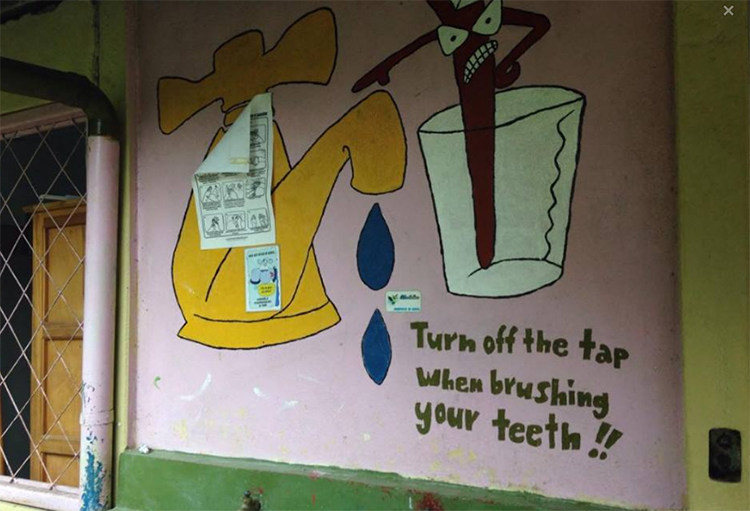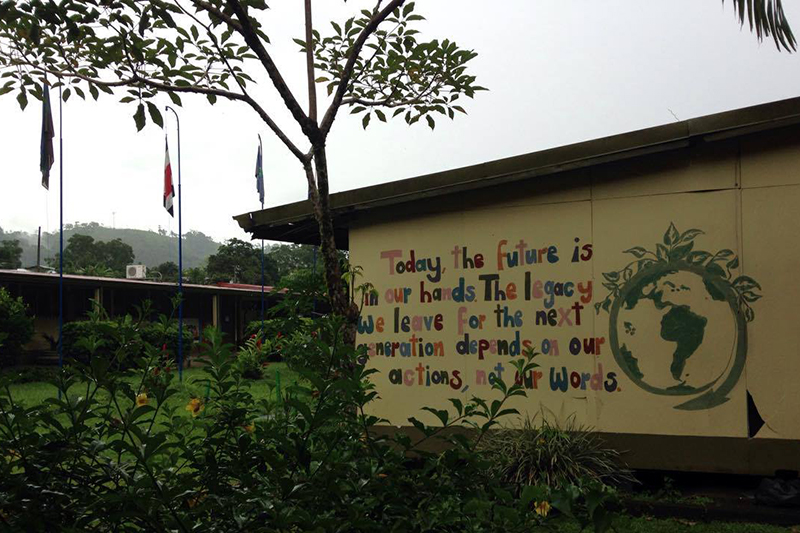Every country has things that make it unique and set it apart from other countries. This can include everything from languages and dialect, food eaten, holidays celebrated, scenery, things that are socially acceptable within the society of the country, and the way businesses, such as offices and schools, are set up.
The mix of social acceptability and the way businesses are set up within a foreign country can definitely make a workplace or school have a much different environment than what you are used to. I am experiencing this in school right now, as my Costa Rican high school definitely has a much different environment than my high school back home. In this post, I am going to be sharing five differences between the two.
1.) The Schedule
At my school in the US, you arrive at 7:25 a.m. and have homeroom. Classes begin at 7:40 a.m., you have nine periods, the classes are the same each day and depend on what you signed up for, there aren’t many (if any) people with the same exact schedule as you. Then, you go back to homeroom in the afternoon and are dismissed from there at 2:40 p.m.. On Fridays, you arrive at 7:40, have nine periods, slightly shorter, and are dismissed from homeroom at 12:10 p.m..
However, at my school in Costa Rica, you arrive at 7:00 a.m. and report to your first period. You can have up to twelve periods, sharing the exact same schedule as the people in your group, and then leave directly from your last class at 4:10. However, the classes vary by day, and you may be able to arrive later than 7:00 or go home before 4:10.
2.) The Freedom
In the US, there are no students roaming the hallways in their free time. Mainly because there is none. If you do not have a core class during a given period and are also not interested in any electives, you will be placed in a study hall where attendance is taken and you usually have to sit in a silent classroom. You are also restricted on the number of study halls you can take, so you may have to spend a year in art class when you definitely aren’t an artist.
In Costa Rica when you don’t have a class, you are free to relax and roam the school, or, as mentioned above, go home or arrive late depending on your schedule for the day.
3.) The Lunch
While I am aware that some American schools offer off-campus lunch, mine does not! We are required to report to the cafeteria at our designated lunch time, and we can bring a packed lunch, eat the school cafeteria food, or of course, not eat if that’s what we want.
In Costa Rica, you can eat food from the cafeteria, bring a packed lunch, or leave and go home (or to the store) to get some food. Also, this is a bit random, but in the United States, you have to sign out to go to the bathroom if you want to brush your teeth after you eat. Here, it is weird to not brush your teeth after you eat: everyone does it.

4.) The Rules
At my home high school, there are strict rules in place about cell phone use, behavior, computer use, and more. You are expected to be respectful and not talk while the teacher is teaching, raise your hand, and complete work silently (or quietly if it is group work.) Cell phones are not permitted; you can even get in trouble for having it in your pocket! Additionally, social media websites are blocked on school computers and there are certain rules about what sites you can use. Also, animals (other than fish) are not permitted in my American school.
In Costa Rica, it is a whole different story. The teachers are more relaxed with rules and offer students flexibility. There are also dogs that roam the school!
5.) The Workload
At home, I was constantly busy with work in class. There is not much free time, you are usually listening to a lecture or completing worksheets and projects from the start of class until the end. On top of that, there was always a test to study for, an essay to write, or homework to do after school. I was usually quite stressed out and definitely busy with schoolwork.
Here, there is not an awful lot of work to be done. The homework is sparse and sometimes, classes are either cancelled or not much work has to be done. It is a lot more of a relaxed environment.
Cassidy Bopp is 16 years old and lives in Saltsburg, Pennsylvania . Her goal during her study abroad program is to “gain a better understanding of the culture in Costa Rica and to see more of the world, and really take it in and appreciate it to the fullest.” Follow Cassidy’s adventure in Costa Rica on her blog post updates throughout her program.

Hi! I was just wondering about daily life in Costa Rica. Are you allowed to travel around by yourself and with your friends? Can you go to beaches, on hikes, to dinner, parties, etc?
Hi Alex, great question! Although solo travel isn’t allowed, you will have opportunities to travel around with other exchange students throughout your time in Costa Rica. You can visits beaches, snorkel, hike, etc. And yes, you can definitely go out to dinner with friends! 🙂
Hello, I was very interested in hearing about learning in Costa Rica because I too would like to send a year abroad learning there. I live in the U.S and I don’t speak any Spanish. In your opinion, would you recommend Costa Rica, or would it be too difficult because I don’t speak their language? Your feedback is very much appreciated. I would love to be a foreign exchange student and so far I am most interested in Costa Rica.
Hi Madeline —
That’s great to hear that you are interested in studying abroad in Costa Rica! We do not require previous language experience for this program and you would be welcome to apply as a beginner. It’s important to keep in mind that you will be living with a host family and this is a full immersion program, so there will definitely be a language barrier for your first few weeks as you learn the language. I might also recommend checking out apps like Duo Lingo or Rosette Stone which can help you learn some of the basics before you go! I hope this helps!
Hello! I am just curious about what required/core classes and the elective classes students can take at an average school in Costa Rica. Also, are there any different things that a Costa Rican student would have in their backpack than an American student would? Thanks:)
Hi, i was wondering if the way you get to school is different in costa rica then it is here in the US also how do your teachers prepare for the classes and how is the overall schools different in their appearance
costa rica is great yes or no?
Hi! I was wondering how the mental health outlets in a Costa Rican school differs from a US school? Are there more or less outlets and are they more or less effective?
Hi I was just wondering what your schools have in common with the U.S. schools
Hola! What do high school sports look like in Costa Rican schools?
Hi Heide!
Much like the U.S., sports vary across schools, but one can often find school sports teams for futbol (soccer) and basketball. There are other school activities, too, such as dance, theatre, music, etc.